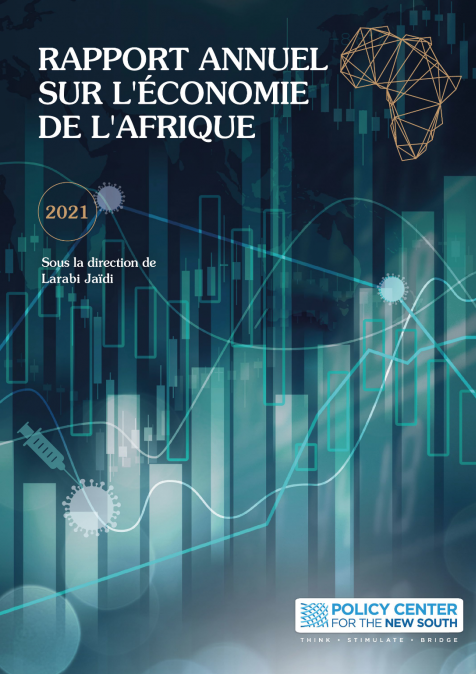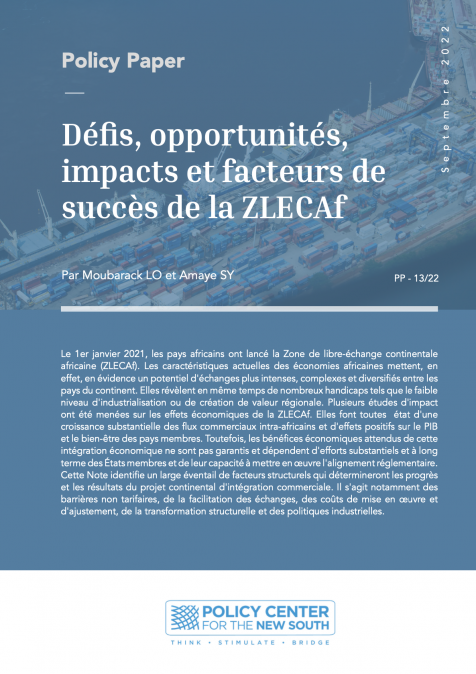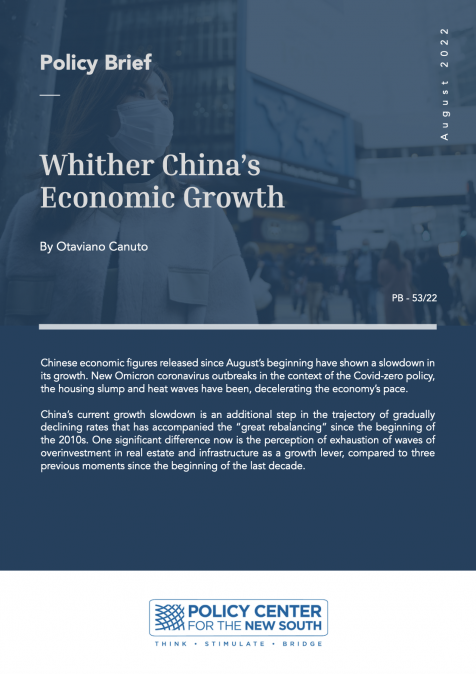Président
- Fathallah Oualalou, Senior Fellow, Policy Center for the New South (PCNS)
Introduction
- Kevin Cleaver, ancien vice-président associé, Fonds international de développement agricole (FIDA)
Intervenants
- Jennifer Blanke, Vice-présidente, Fondation Syngenta pour l'agriculture durable (SFSA)
- Bambang Brodjonegoro, président du conseil des commissaires, Bukalapak et PT Telkom
- Nguyen Minh Hang, vice-ministre des affaires étrangères, Vietnam
- Megumi Muto, vice-président de l'Agence japonaise de coopération internationale (JICA)
- Cecilia Nahón, directrice exécutive suppléante, Groupe de la Banque mondiale, Argentine
RELATED CONTENT
-
 AuthorsSeptember 29, 2022Une des missions de l’IGAD, sinon la plus importante, est de « promouvoir la coopération et l’intégration régionales afin d’ajouter de la valeur aux efforts des États membres pour parvenir à la paix, la sécurité et la prospérité ». Il faut relever que l’organisation fait face à une prolifération de conflits régionaux. Elle se trouve, en effet, à un moment critique et toute nouvelle perte de confiance pourrait conduire à une crise encore plus complexe. Si l’IGAD continue de subir les ...
AuthorsSeptember 29, 2022Une des missions de l’IGAD, sinon la plus importante, est de « promouvoir la coopération et l’intégration régionales afin d’ajouter de la valeur aux efforts des États membres pour parvenir à la paix, la sécurité et la prospérité ». Il faut relever que l’organisation fait face à une prolifération de conflits régionaux. Elle se trouve, en effet, à un moment critique et toute nouvelle perte de confiance pourrait conduire à une crise encore plus complexe. Si l’IGAD continue de subir les ... -
AuthorsSeptember 26, 2022Le Maroc a entamé la libéralisation de son commerce extérieur dès le début des années 80 du XXième siècle. Les négociations commerciales des Accords de libre-échange et les engagements contractés auprès de l’Organisation mondiale du commerce (OMC) ont constitué des moments forts dans le processus d’introduction de réformes plus substantielles au régime du commerce extérieur (engagements sur des horizons de démantèlement, établissement des listes, réforme des barr ...
-
September 23, 2022Relations between Rabat and Seoul have been in a state of considerable flux in every aspect since the establishment of diplomatic relations between the two countries in July 1962. The Korean embassy in Rabat is Seoul's first permanent diplomatic representation on the African continent. ...
-
September 23, 2022A l’occasion de l’anniversaire des 60 ans des relations diplomatiques et économiques entre la République de Corée et le Royaume du Maroc, une rencontre est organisée par le Policy Center for the New South en collaboration avec le Korean Institute for International Economic Policy (KIEP)...
-
Otaviano Canuto & Oumayma BourhribaSeptember 16, 2022In the current context of persistent inflationary pressures and growing uncertainties about the economic outlook, many central banks have mainly focused on their mandate of price stabilit ...
-
 AuthorsSeptember 15, 2022Le dialogue social est à la croisée des chemins. Le deuxième round du dialogue social va être lancé aujourd’hui. À l’ordre du jour, la négociation sur des dossiers en instance depuis de longues années (le droit de grève, la représentation des syndicats, le code du travail, les libertés syndicales,…). Mais la grande question qui figure dans l’agenda des parties prenantes est bien celle de l’institutionnalisation des mécanismes d’un dialogue pérenne et efficace, en plus de celle de so ...
AuthorsSeptember 15, 2022Le dialogue social est à la croisée des chemins. Le deuxième round du dialogue social va être lancé aujourd’hui. À l’ordre du jour, la négociation sur des dossiers en instance depuis de longues années (le droit de grève, la représentation des syndicats, le code du travail, les libertés syndicales,…). Mais la grande question qui figure dans l’agenda des parties prenantes est bien celle de l’institutionnalisation des mécanismes d’un dialogue pérenne et efficace, en plus de celle de so ... -
AuthorsMoubarack LoAmaye SYSeptember 5, 2022Le 1er janvier 2021, les pays africains ont lancé la Zone de libre-échange continentale africaine (ZLECAf). Les caractéristiques actuelles des économies africaines mettent, en effet, en évidence un potentiel d'échanges plus intenses, complexes et diversifiés entre les pays du continent. Elles révèlent en même temps de nombreux handicaps tels que le faible niveau d'industrialisation ou de création de valeur régionale. Plusieurs études d'impact ont été menées sur les e ...
-
AuthorsAugust 30, 2022Rwanda is famous for its remarkable socio-economic performance after the ravages of the Genocide against the Tutsis and moderate Hutus in 1994. Under the leadership of President Paul Kagame, Rwanda has followed a state-led development model with stunning results. Despite these substantial accomplishments, Rwanda is still a low-income country with extensive poverty. Its agriculture is still of low productivity and highly vulnerable to climate change. Structural transformation has we ...
-
AuthorsAugust 24, 2022Chinese economic figures released since August’s beginning have shown a slowdown in its growth. New Omicron coronavirus outbreaks in the context of the Covid-zero policy, the housing slump and heat waves have been, decelerating the economy’s pace. China’s current growth slowdown is an additional step in the trajectory of gradually declining rates that has accompanied the “great rebalancing” since the beginning of the 2010s. One significant difference now is the perception of exhaus ...
-
AuthorsAugust 23, 2022Disruptions to global value chains (GVCs) – caused by conflicts, natural disasters, and accidents that close transport routes – and that affect specific regions or sectors, are not unusual. However, in recent years and amid the Covid-19 pandemic, they have become more frequent and severe. High profile, sizeable, and repeated disruptions raise pressing questions: Is the breakdown in many GVCs a temporary glitch, or a permanent phenomenon? Have GVCs become endemically more accident pr ...








